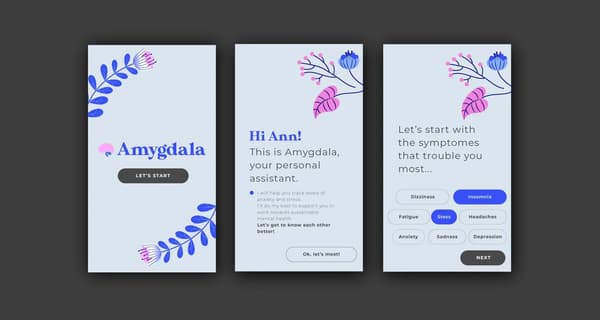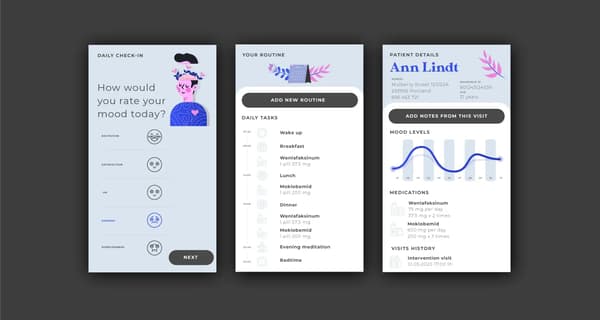
Designing with AI for Mental Health. Amygdala Case Study
Inside this article:
State of Mental Health
Mental health is the number 1 disability globally, with about 18% of US adults suffering from mental health illness in a given year. It is one of the most stigmatized and hidden disabilities, and 75% of these people suffering do not seek the help they need. On average, mental health disability costs over $1 trillion every year in lost productivity. These numbers show a perspective on mental health from 2019. Now in 2020, we’re in a global pandemic that will undoubtedly exacerbate mental health issues. Lockdown, fear of the unknown, social distancing that impacts our relationships, and financial crises are summing up to increased anxiety, depression, bipolar disorder, or PTSD. Significant barriers exist to getting care, chief among them the long-standing stigma associated with mental illness. But there’s an even more dire reality: as recent events push more people to the brink, there simply aren’t enough clinicians and specialists to treat everyone who needs help.
2020 is not our best year. But on the other hand, we have entered a fascinating era for mental and behavioral health care. Advances in AI make it possible to build intelligent systems that enhance the quality, accessibility, and efficiency of care while also providing entirely new opportunities.

AI solutions for mental health
There are many ways in which machine learning can help us better understand — and possibly treat — various health conditions. The mental and behavioral healthcare fields are also benefiting from advancements in AI. Where are we now? Where and how AI is helping to tackle mental health issues?
Image Analysis
Machine learning and deep learning techniques work best when we can train them on vast physical datasets. Therefore, we can already see a significant shift in medical image processing supported by AI. Detecting liaisons, tumors, and tissue abnormalities in X-ray, CT, or PET scans is not the only way image processing can help. For mental disorders, AI can also track different signaling pathways and abnormal network activities and aid medical image interpretation. A great example of how machine learning supports mental health treatment is in the early detection of Alzheimer’s disease. Researchers at the University of California show that a simple PET scan powered with ML can detect Alzheimer’s six years before a definitive diagnosis that is based on (at this stage usually irreversible) clinical symptoms. A study from Carnegie Mellon University and the University of Pittsburgh shows how to identify suicidal individuals by analyzing the alterations in how brain patterns represent certain death-related concepts. The model accurately distinguished people who had attempted to take their lives with 94 percent accuracy. Researchers are continually developing their program to apply their findings to a much larger sample and then use it to predict future suicide attempts.
Chatbots and Conversational Agents for Cognitive Behavioral Therapy
Another use case for incorporating AI into the mental health sector are chatbots. The integration of natural language processing and virtual reality has allowed for creating interactive intelligent virtual humans that can provide daily consultation and simplified therapy. Mental health chatbots continue to improve with natural language processing and deep learning. They provide thoughtful self-assessment options to determine the severity of mental illness and an opportunity to fight with daily anxieties when they are still possible to harness without medication or professional help. As AI techniques continue to be retrained, refined and improved, it may be possible to identify mental illnesses at an earlier or prodromal stage when interventions may be more effective and tailor prescribed treatments based on an individual’s unique typing characteristics.
Voice Recognition, Image Recognition and Text Analysis for prediction, monitoring, and prevention
We already know that people’s behavior changes on many different levels when they shift towards suicidal or self-harm crisis. Our phones and apps can track various data points to determine if the user is at risk. To identify users in emotional distress, Facebook looks out for worrying patterns with text analysis in posts and comments (user’s and friends). Researchers from Facebook’s FAIR project expand the study to include facial expressions from images and video posts to identify people in distress. IBM Research couples machine learning techniques to focus on voice recognition and analysis from psychiatric interviews. Their models find verbal speech patterns to help clinicians accurately predict and monitor psychosis, schizophrenia, mania, and depression. AI algorithms can be harnessed to draw meaning from broad and varied data sources comprehensively. They give the power to analyze individual behavior and offer the technology to monitor treatment progress and medication adherence. Whatsmore, they also enable a better understanding of the population-level prevalence of mental diseases, uncover biological mechanisms or risk/protective factors, and create treatment processes and medication.
Amygdala
At nexocode, we’ve been enthused to see many app developers stepping up to the plate to support mental health in innovative ways. As a team of designers and software engineers specializing in ML projects, we couldn’t help but wonder how to contribute and help people feel less distressed. How to design for mental health with AI? As an inner nexocode project, we ran an AI Design Sprint to deeply analyze the problem space and find AI opportunities to design a new AI-based product. We came up with an idea to create a custom solution that mixes the solutions mentioned earlier and aids mental health. The Amygdala project aims to utilize AI opportunities to empower people by promoting emotional resilience and well-being. AI Design Sprint methodology helped us to clarify the project goal. In the mental health context, Amygdala’s goal is to reduce the gap between people who have a mental illness, whether it is diagnosed, long-term, or situational, and the tools and interventions to help them. We believe that technology-enhanced mental health and well-being interventions can reduce barriers and increase engagement in activities that promote well-being and self-efficacy.
Conversational interface for daily support
Amygdala is a mobile app designed to help people better manage their mental health by translating evidence-based Cognitive Behavioral Therapy to technology-delivered interventions. Amygdala has a friendly, conversational interface that allows people to track their daily emotions and habits and learn and implement concrete coping skills to manage adverse events and emotions better. Our AI-based chatbot holds a conversation to determine the user’s current feelings and recommends coping mechanisms. Amygdala aims to provide holistic support for the user to foster statistically and clinically significant improvements in depression, anxiety, and coping skill use. Routine is an essential part of the therapy. That is why we’ve created a dedicated section to better plan and execute daily habits, including medication intake, daily habits, and focus areas for the day. The exercises section is there to help users find inner peace and immediately overcome anxiety through breathwork, meditation, and easy-to-follow physical exercises.

Helping hand for clinicians
Well-trained mental health specialists are in inadequate supply. Their time is progressively limited as mental healthcare needs grow, and even if you do get the support of a specialist, it is rarely provided as daily access. Physicians are burdened with increased documentation requirements and inefficient technology. These problems are incredibly cumbersome for mental health practitioners who must rely on their uniquely human skills in order to foster therapeutic rapport with their patients and design personalized treatments. While research and development of technology-based mental health resources continue to improve, these apps are not intended to replace the clinical treatment of any mental health condition. This fact came out loud during our dedicated AI Design Sprint workshops. That is why we decided that the Amygdala app will streamline the cooperation between patients and specialists. Amygdala delivers remote therapeutic sessions, so crucial in a social distance world and helpful for people who previously had to travel or take long commutes to get to their specialist. Clinicians get access to data reported by their patients and AI analysis and recommendations. By leveraging individuals’ app data, including contextual information, personal characteristics, goals, and self-reported outcomes, the application can recommend the most effective interventions and treatments based on individual factors and contexts. Thanks to that, specialists can focus on the personal therapy they provide.

What’s next?
AI is increasingly a part of digital medicine and will contribute to mental health research and practice. The current and forthcoming advances in AI will transform behavioral and cognitive health care in the years ahead. Given these advances, it is essential for healthcare professionals, AI systems designers, and developers to be aware of the current and emerging capabilities, challenges, and opportunities that AI brings to the behavioral and mental healthcare arenas. Like in other sectors, and health care is no different, when we think about AI solutions, there’s always the hope, the hype, the promise, and the peril. We must understand that AI alone cannot cure healthcare’s ills and that new technologies bring novel and potentially under-appreciated challenges. Discovering new relationships between mental illnesses and latent variables relies significantly on the availability of enormous, high-quality datasets. AI algorithms will be developed from emerging data sources, and our future in this area depends on the strong cooperation between data scientists, AI designers, and clinicians. Finally, what is also super important is that our culture needs to be modified so that mental health services are more accepted and less stigmatized. Here, the sole popularization of the challenges and possible software solutions is already of great help. Read more about role of AI in drug discovery and development here.



